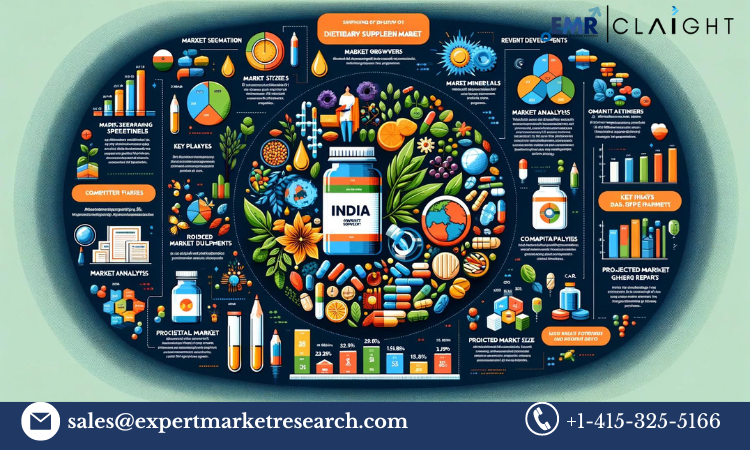In recent years, the Indian dietary supplement market has seen a remarkable expansion, driven by an increasing awareness of health and wellness across the country. Valued at USD 5.91 billion in 2023, the market is anticipated to grow at an impressive CAGR of 15.82%, reaching USD 22.15 billion by 2032. This growth can be attributed to lifestyle shifts, rising disposable incomes, and a focus on preventive healthcare. This report provides an in-depth analysis of the current market dynamics, key players, trends, and growth prospects in India.
2. Understanding Dietary Supplements and Their Role
- Definition and Types: Dietary supplements encompass a range of products, including vitamins, minerals, herbs, amino acids, and enzymes, designed to enhance overall health.
- Significance of Supplements: These products play a crucial role in supporting a balanced diet, especially as modern lifestyles often lack essential nutrients. They are particularly vital for specific populations, including older adults and those with nutrient deficiencies.
- Regulatory Framework: In India, dietary supplements are regulated under the Food Safety and Standards Authority of India (FSSAI). Companies must adhere to guidelines to ensure safety, quality, and efficacy.
3. Market Dynamics Shaping Growth
- Market Drivers
- Rising Health Awareness: Increasing health literacy is leading consumers toward preventive healthcare measures, with supplements seen as an effective means to maintain good health.
- Shifts in Lifestyle and Income: Urbanization, rising income levels, and changing lifestyles are promoting the adoption of dietary supplements, especially among health-conscious individuals.
- Aging Population: India’s growing elderly population requires specific dietary interventions, driving demand for supplements targeting bone health, immunity, and vitality.
- Market Restraints
- Regulatory and Safety Concerns: Strict regulations and quality concerns can hinder market growth, especially for companies that struggle to meet FSSAI standards.
- Price Sensitivity: High costs of certain supplements may discourage some consumer segments, limiting overall market reach.
- Opportunities
- Expanding into Rural Markets: With healthcare and wellness trends reaching rural areas, companies can tap into these underserved regions.
- Innovation in Supplement Formats: Consumer demand for easy-to-consume supplements like gummies, chewables, and effervescent tablets presents opportunities for product differentiation.
- Challenges
- Consumer Skepticism: Concerns over the efficacy and quality of supplements can deter potential buyers, making brand reputation and transparency essential.
- Intense Competition: Both established brands and new entrants vie for market share, necessitating robust marketing and product differentiation.
4. Detailed Market Segmentation
The Indian dietary supplement market can be segmented based on several factors:
- Product Type: Vitamins, minerals, herbal supplements, and proteins are the most common categories, each catering to specific health needs.
- Form: Tablets, capsules, powders, and liquids offer options based on consumer preferences.
- Distribution Channel: Pharmacies, online platforms, specialty stores, and supermarkets each contribute uniquely to product reach.
- End-User: While adults are the primary consumers, there is a growing segment for children and the elderly, each with targeted formulations.
5. Key Market Trends Influencing the India Dietary Supplement Market
- Digital and E-commerce Growth: The popularity of online retail has transformed the supplement market, with companies leveraging digital platforms to reach a broader audience.
- Demand for Organic and Herbal Products: Indian consumers, driven by Ayurvedic and holistic health beliefs, increasingly prefer natural supplements, which has boosted the demand for herbal-based products.
- Influence of Digital Marketing: With social media and influencers playing a significant role, companies invest in digital campaigns to create brand awareness and consumer trust.
- Personalization of Supplements: Emerging interest in personalized health has led to customized supplements tailored to individual needs and lifestyles.
6. Competitive Landscape of India Dietary Supplement Market
A key component of this report includes a comprehensive analysis of the competitive landscape, focusing on patent analysis, clinical trials, funding, partnerships, and collaborations among key players. Major players include:
- Dabur India Limited: Known for its Ayurvedic approach, Dabur offers a range of herbal supplements.
- Herbalife International India: Focusing on weight management and wellness products, Herbalife has a strong distribution network.
- Amway India Enterprises: With a global presence, Amway offers supplements for immunity, heart health, and general wellness.
- The Himalaya Drug Company: Specializing in herbal and Ayurvedic products, Himalaya’s portfolio includes supplements for various health concerns.
- Abbott India Limited: As a leading pharmaceutical company, Abbott provides high-quality vitamins and nutritional products.
- Kraft Heinz India: With a focus on kids’ health, Kraft Heinz offers dietary supplements catering to nutritional needs in children.
- Sun Pharmaceutical: Known for its pharmaceutical expertise, Sun Pharma offers high-quality supplements, particularly in minerals and vitamins.
- GlaxoSmithKline Consumer Healthcare: Offering a range of consumer health products, GSK emphasizes supplements for immunity and bone health.
- Danone Nutricia International: Specializing in medical nutrition, Danone caters to specific health needs across age groups.
- Patanjali Ayurved: Leveraging India’s herbal heritage, Patanjali promotes Ayurvedic dietary supplements to meet the demand for natural products.
7. In-Depth Patent, Grants, and Clinical Trial Analysis
- Patent Landscape: The report covers recent patents related to dietary supplements, showcasing innovations in ingredient formulations and delivery methods.
- Grants and Funding: Analysis of funding activities highlights investments in R&D and innovations aimed at enhancing product efficacy and safety.
- Clinical Trials: Leading companies continue to conduct clinical trials to validate product claims, especially for supplements targeting immunity, digestion, and energy.
8. Investment and Funding Analysis in India Dietary Supplement Market
Investments in the dietary supplement industry continue to grow, driven by venture capital interest in wellness products. This section details major funding rounds, private equity investments, and initiatives to foster innovation in the Indian market.
9. India Dietary Supplement Market Size and Forecast (2023-2032)
- 2023 Market Size: The market size of USD 5.91 billion in 2023 illustrates the scale of consumer interest in dietary supplements.
- Forecast to 2032: Projected to reach USD 22.15 billion by 2032, this growth is fueled by increased awareness and healthcare accessibility.
- Segmentation Forecasts: Projections for product types, distribution channels, and regional variations, along with CAGR analysis across segments.
10. Consumer Insights and Behavior Analysis
- Consumer Preferences: Insights on Indian consumers’ preferences reveal a shift toward herbal, organic, and natural products.
- Buying Behavior: Online retail has influenced purchasing patterns, with consumers seeking convenient, reliable, and reputable brands.
- Influence of Digital Media: Social media platforms and influencer endorsements have a powerful impact on consumer trust and decision-making.
11. Challenges and Future Outlook for the India Dietary Supplement Market
- Current Challenges: Market players face challenges in ensuring product quality, managing regulatory compliance, and addressing consumer skepticism.
- Future Opportunities: Innovations in product formulation, personalized supplements, and expansion into rural areas offer promising growth paths.
- Strategic Recommendations: Companies should focus on transparent labeling, quality assurance, and digital marketing to build consumer trust and capture market share.
- Long-Term Outlook: With rising awareness and demand, the dietary supplement market in India is poised for robust growth, with an expanding consumer base and evolving product portfolios.



